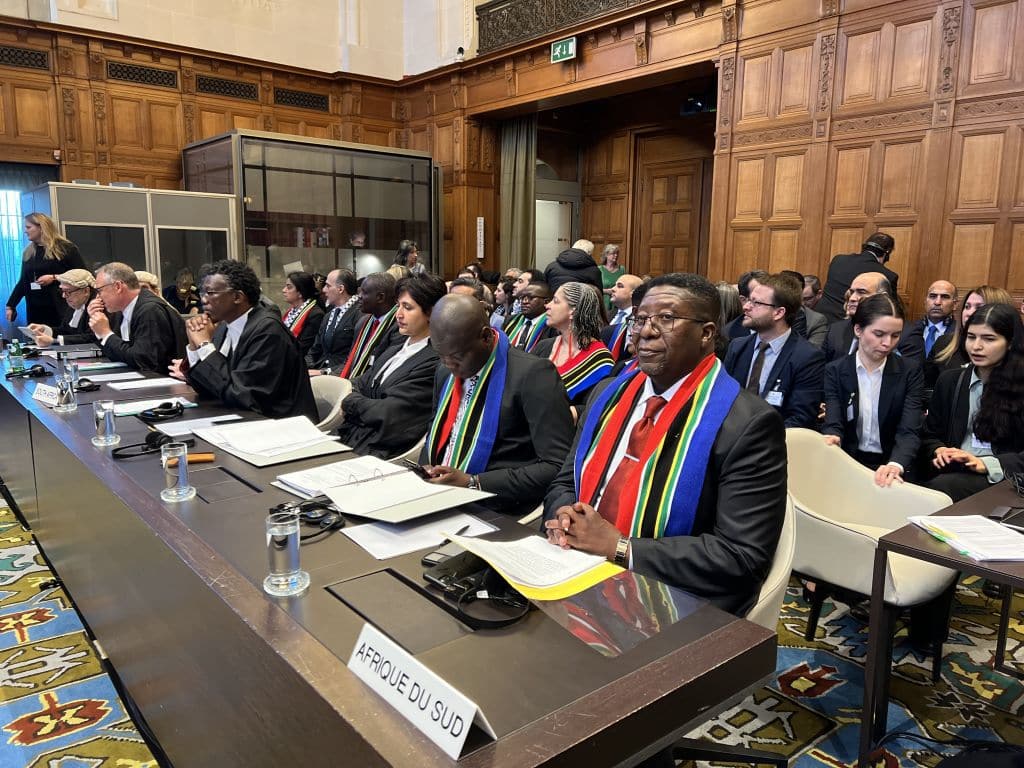Topline
Thursday, January 11, marked the start of an unprecedented legal confrontation at the International Court of Justice (ICJ) in The Hague in the Netherlands, as South Africa argued that Israel’s actions in Gaza amount to “genocide”. The country has also condemned all violations of international law by all parties, including the actions of Hamas. The case, which has drawn worldwide attention, emphasizes the complexities of the ongoing conflict and the diverse global reactions it has ignited.
Key Facts
- South Africa presents its case first at the ICJ. The claim by its legal team, led by Tembeka Ngcukaitobi, is supported by an 84-page application citing Israeli military and political statements.
- The South African application states, “No armed attack on a State’s territory, no matter how serious…can provide any possible justification for or defense to breaches of the 1948 Convention on the Prevention and Punishment of the Crime of Genocide.”
- Israel’s President Isaac Herzog firmly rejects these accusations, asserting the country’s stance of self-defense and adherence to humanitarian law.
- Ngcukaitobi stated, “The intent to destroy Gaza has been nurtured at the highest level of state,” emphasizing the severity of the situation. His colleague, Adila Hassim, reinforced this sentiment by highlighting the daily suffering of Palestinians: “Every day, there is mounting, irreparable loss of life, property, dignity, and humanity for the Palestinian people.”
- The case has sparked significant public interest and polarized views, with demonstrations outside the ICJ and an international outcry from countries like Bolivia, Brazil, Colombia, Turkey and Iran supporting South Africa’s allegations.
- Its outcome could have potential ramifications for South Africa’s diplomatic relations with the United States (US), an ally of Israel.
Contra
Israel has firmly rejected the accusations. Israeli President Isaac Herzog denounced the claims as “atrocious and preposterous”, asserting Israel’s stance of self-defense. “We will present proudly our case of using self-defense… under humanitarian law,” Herzog declared during a meeting with visiting US Secretary of State Anthony Blinken, emphasizing Israel’s commitment to avoiding civilian casualties.
Amidst the legal battle, the South African Jewish Board of Deputies (SAJBD) has criticized the South African government’s approach. In a statement issued by Prof Karen Milner, National Chair of the SAJBD, the organization accused South Africa of an “inversion of justice”. Milner pointed to South Africa’s alignment with Hamas and the inclusion of controversial figures in its delegation as evidence of a flawed and biased perspective. “This says volumes about South Africa’s intention,” Milner remarked, questioning the motives behind the legal action.
Key Background
This legal confrontation at the ICJ comes against a backdrop of escalating violence and political strife in Gaza. The 84-page application was lodged with the ICJ on December 29 2023. The ICJ’s role in this matter is limited to issuing opinions on allegations, which, while not enforceable, carry significant moral and political weight. The conflict has claimed over 23,000 lives according to Gaza’s health ministry.
The US, historically an ally of Israel, may find its diplomatic stance with South Africa challenged, depending on the outcome and reactions to the ICJ’s ruling. Zane Dangor, Director-General of South Africa’s Department of International Relations and Cooperation, commented on the potential impact of the case during a media conference last week. “We will be able to see how we regain this after the hearings are done but clearly, under the current circumstances, the relationship is not going to be normal and we will have to look at how do we engage after this, particularly working towards a permanent solution for the relationship,” adding, “We feel that our position is the principled one and that is something that they understand.”
